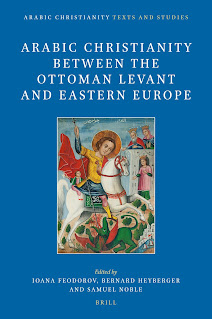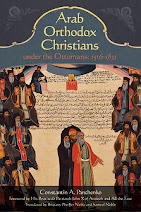The Arabic original, first published in the newspaper al-Nahar, can be found here.
Our Demons
Some Christians have begun the great forty-day fast, and others will start it next Monday. For them, the fast is abstinence from food and drink at certain times and refraining from certain kinds of foods. In this fast Christians prepare to receive the Christ the Lord risen from the dead on the glorious feast of Easter.
The basic lesson of the fast is repentance. That is, a return to God after an absence caused by sin. A person who is fasting struggles in his fast to practice combating sin and eliminating it. The purpose of the fast is not abstinence from food and drink, but rather the higher purpose is repentance, and, consequently, holiness. Fasting from food is just one of the many means of achieving this desired goal. This is what the Apostle Paul meant when he said, "Food is for the belly and the belly for food. God will destroy both together. But the human body is not for fornication, but rather it is for the Lord and the Lord is for the body" (1 Corinthians 6:13).
Without denying the importance of the fast as it is practiced today, is there a need for a simultaneous fast from various things that happen to us in our daily life that cause us to be estranged from God and His commandments? There is no doubt that the answer is that there is indeed an urgent need for other forms of fasting. In many religious traditions there are accounts of fasts practiced by the faithful in times of trial and hardship. Are our current days not times of trial and hardship, that we shouldn't go fast as demanded of us by the painful circumstances that threaten our future from every direction?
Christ the Lord criticizes the Pharisees, the scholars and teachers of the Law, for being attached to the literal sense of the Law but ignoring its spirit. He says, "Hypocrites! You give tithes of mint, thyme, and cumin but you ignore the most important thing in the Law: justice and mercy and righteousness. These are the things that you should have done, without ignoring the rest" (Matthew 23:23). He also says, "I desire mercy and not sacrifice" (Matthew 9:13). Mercy is what is desired by the commandments of the Law, rites, rituals, and worship, all of it. One who possesses mercy possesses the other virtues and values, especially justice and righteousness.
The fast is for the sake of acquiring mercy, justice and righteousness. The fast precludes violence, resentment, and hatred, enmity, combativeness, and fighting between brothers or between fellow-citizens. It precludes working for or engaging in strife with words or actions. It precludes religious hatred, sectarian division, and religious triumphalism. It precludes religious radicalism and extremism. It precludes racism and discriminating between God's creation. It precludes corruption, exploitation, the worship of power and wealth. It precludes lying, which is the gate of all vices.
These are the demons that sing and dance through the air of our country. They will not be eliminated except through fasting from the plagues that afflict our societies, which sew in the souls of our children the seeds of backwardness, intolerance, and moral decline. Christ said, "This kind (of demon) does not go out except through prayer and fasting" (Mark 9:29), meaning by demons all sorts of sins and transgressions. He Himself enumerates them when he says, "Out of the hearts of men come evil thoughts: debauchery, theft, murder, adultery, greed, malice, fraud, fornication, jealousy, slander, pride, and ignorance. All these evil things come from within man and make him unclean" (Mark 7:21-23).
Man is more cunning than the demons. Man has become the demons' teacher. But the doors of repentance are open to him, when he desires out of his own freedom and free will. Our country is in need of its children repenting of the inclinations they have acquired from the demons. So let the fast be consecrated to destroying them so that we might be worthy of life, in truth.
Fr. Georges Massouh is professor of Islamic Studies at Balamand University.
Our Demons
Some Christians have begun the great forty-day fast, and others will start it next Monday. For them, the fast is abstinence from food and drink at certain times and refraining from certain kinds of foods. In this fast Christians prepare to receive the Christ the Lord risen from the dead on the glorious feast of Easter.
The basic lesson of the fast is repentance. That is, a return to God after an absence caused by sin. A person who is fasting struggles in his fast to practice combating sin and eliminating it. The purpose of the fast is not abstinence from food and drink, but rather the higher purpose is repentance, and, consequently, holiness. Fasting from food is just one of the many means of achieving this desired goal. This is what the Apostle Paul meant when he said, "Food is for the belly and the belly for food. God will destroy both together. But the human body is not for fornication, but rather it is for the Lord and the Lord is for the body" (1 Corinthians 6:13).
Without denying the importance of the fast as it is practiced today, is there a need for a simultaneous fast from various things that happen to us in our daily life that cause us to be estranged from God and His commandments? There is no doubt that the answer is that there is indeed an urgent need for other forms of fasting. In many religious traditions there are accounts of fasts practiced by the faithful in times of trial and hardship. Are our current days not times of trial and hardship, that we shouldn't go fast as demanded of us by the painful circumstances that threaten our future from every direction?
Christ the Lord criticizes the Pharisees, the scholars and teachers of the Law, for being attached to the literal sense of the Law but ignoring its spirit. He says, "Hypocrites! You give tithes of mint, thyme, and cumin but you ignore the most important thing in the Law: justice and mercy and righteousness. These are the things that you should have done, without ignoring the rest" (Matthew 23:23). He also says, "I desire mercy and not sacrifice" (Matthew 9:13). Mercy is what is desired by the commandments of the Law, rites, rituals, and worship, all of it. One who possesses mercy possesses the other virtues and values, especially justice and righteousness.
The fast is for the sake of acquiring mercy, justice and righteousness. The fast precludes violence, resentment, and hatred, enmity, combativeness, and fighting between brothers or between fellow-citizens. It precludes working for or engaging in strife with words or actions. It precludes religious hatred, sectarian division, and religious triumphalism. It precludes religious radicalism and extremism. It precludes racism and discriminating between God's creation. It precludes corruption, exploitation, the worship of power and wealth. It precludes lying, which is the gate of all vices.
These are the demons that sing and dance through the air of our country. They will not be eliminated except through fasting from the plagues that afflict our societies, which sew in the souls of our children the seeds of backwardness, intolerance, and moral decline. Christ said, "This kind (of demon) does not go out except through prayer and fasting" (Mark 9:29), meaning by demons all sorts of sins and transgressions. He Himself enumerates them when he says, "Out of the hearts of men come evil thoughts: debauchery, theft, murder, adultery, greed, malice, fraud, fornication, jealousy, slander, pride, and ignorance. All these evil things come from within man and make him unclean" (Mark 7:21-23).
Man is more cunning than the demons. Man has become the demons' teacher. But the doors of repentance are open to him, when he desires out of his own freedom and free will. Our country is in need of its children repenting of the inclinations they have acquired from the demons. So let the fast be consecrated to destroying them so that we might be worthy of life, in truth.
Fr. Georges Massouh is professor of Islamic Studies at Balamand University.








No comments:
Post a Comment